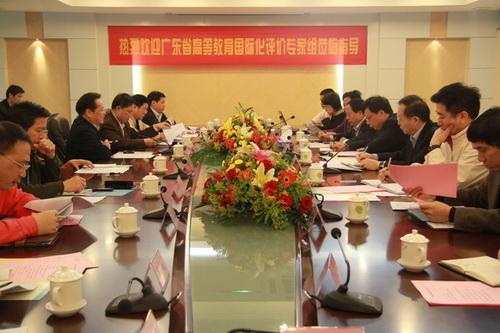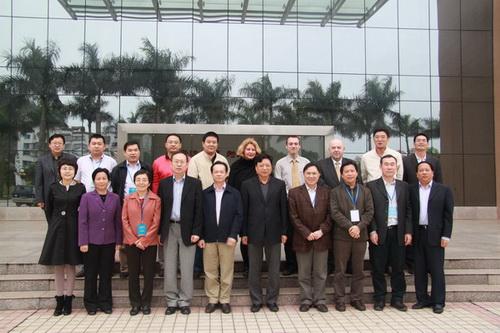On April 15th, 2010, a group of experts from the Guangdong Province Higher Education Internationalization Board assessed Huizhou University s current efforts at internationalization. The Provincial assessment experts group, university leaders Mr. Li Xiufeng and Dr. Yang Haitao, as well as various other personnel were in attendance. The meeting was hosted by Liang Yonghong, the section chief of the Communication and Cooperation Bureau of the Provincial Department of Education.
At the meeting, president Yang Haitao, on behalf of HZU s teachers and students, first welcomed the expert assessment group to supervise the work. He said HZU conducts its internationalization work according to 3 principles: advocate of ideas, active promotion, and breakthrough of key projects. In regard to advocate of ideas, he went on to say that the internationalization of education is not a privilege of the 211 Project universities, the 985 colleges, or other large scale institutions for higher education. Internationalization also doesn t mean teaching only in English, or the transition to a research university. Internationalization of higher education is rather an inevitable trend for the university s development. Discussing active promotion, it was said that to gain acceptance and support from HZU s teachers and students, the university should promote the idea of internationalization throughout its organization. It is therefore necessary to create various opportunities for teachers and students to jointly promote the university's internationalization. As for the breakthrough of key projects, we have chosen the student exchange program as the breakthrough. In all, Dr. Yang said, internationalizing education must be a long-term strategic mission, and should be developed unremittingly.
The Associate Director of Foreign Affairs Office Ms Lin Hong also presented a topical report about the current state of Huizhou University s internationalization efforts, mainly discussing 3 aspects: The current situation of HZU, work towards internationalization, and the direction and implementation of programs.
The experts of the assessment group also had an informal discussion with the university leadership, teacher representatives (including foreign teaching staff), administrative staff representatives, and student representatives.
After the discussion, the assessment group experts expressed their unanimous appreciation for the internationalization work HZU has done in recent years. They felt the school's internationalization was beginning to take shape and form its own characteristics. The Group suggested that HZU should take this assessment as a starting point, combine and formulate according to the 125 Programs, and continue to perfect their internationalization projects. Projects should feature goals in regard to both scale and quality. They also suggested HZU try hard to examine other local universities' current patterns of internationalization in regards to education to help effectively identify, assess, and possibly solve future problems. The Group finally expressed their sincere hope that in 5 years, through the joint effort of HZU s teachers and students, the university could be among the leading international-standard universities of Guangdong Province.


Related News
- Solo Music Recital from Ned Kirk, Associate Professor of Saint Mary's University, Minnesota
- Vice-President of Douglas College in Canada Visits Huizhou University
- HZU Appoints Foreign Expert as Senior Advisor to the IAO
- Our University Held the Co-Organization Mobilization Meeting for the 13th Provincial Games
Photos
More>>history
- President Yang Haitao Spoke at the Joint Conference of New National Undergraduat
- The President of F+U Training Center Introduces the Training Programs on Our
- Silver Award at the 18th JEANSWEST Leisure Wear Design Contest for Department of
- Third Price at 2009 CCTV Cup English Speaking Contest, Guangdong Area
- Visit of the Mayor of North Vancouver, Canada to HZU





